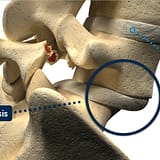Why discs degenerate and why do they hurt ?

Okinawa sports and Spinal research update: Understanding the Causes of Disc Degeneration and how it relates to your pain
Disc degeneration is a common condition that affects the spinal discs, leading to pain, reduced mobility, and potential complications. It’s one of the most common reasons people chose to see a chiropractor or Physical therapist at Okinawa Sports and Spinal.
While disc degeneration is a natural part of the aging process, several factors can accelerate its progression, we will delve into the underlying causes of disc degeneration, exploring both age-related and external factors that contribute to this condition. Understanding these causes can help individuals take preventive measures and adopt healthier lifestyles to mitigate the impact of disc degeneration.
- Age-Related Factors As we age, our spinal discs undergo natural degenerative changes. The intervertebral discs, responsible for cushioning and providing flexibility to the spine, lose their water content and elasticity over time. This gradual degeneration leads to a decrease in disc height, resulting in decreased shock absorption and increased vulnerability to injuries. Additionally, the reduced nutrient supply to the discs and the accumulation of wear and tear over the years contribute to their degeneration. While age-related disc degeneration is inevitable, adopting healthy habits and practices can help slow down its progression.
- Genetics and Hereditary Factors Genetics play a significant role in determining an individual’s susceptibility to disc degeneration. Studies have identified specific genes associated with disc-related disorders, suggesting a hereditary component. Variations in genes responsible for collagen structure, inflammatory response, and disc metabolism can impact the strength and resilience of the spinal discs. Understanding one’s genetic predisposition can aid in making informed decisions regarding lifestyle choices, including exercise, posture, and overall spinal health maintenance.
- Mechanical Factors and Wear and Tear Mechanical factors and repetitive stress on the spine can contribute to disc degeneration. Poor posture, excessive bending, twisting, and lifting heavy objects can exert undue pressure on the discs, leading to microtraumas and accelerated wear and tear. Repetitive movements or occupations that involve prolonged sitting or standing can also contribute to disc degeneration. Maintaining proper body mechanics, using ergonomic equipment, and taking frequent breaks during activities involving repetitive movements can help reduce the strain on the spinal discs.
- Lifestyle and Habits Certain lifestyle factors and habits can impact the health of spinal discs. Obesity or excessive weight places additional stress on the spine, accelerating disc degeneration. Smoking has also been associated with an increased risk of disc degeneration due to its detrimental effects on disc nutrition and blood supply. Sedentary lifestyles devoid of regular exercise and physical activity can weaken the supporting structures of the spine and contribute to disc degeneration. Adopting a healthy lifestyle, including regular exercise, weight management, and smoking cessation, can help mitigate the risk of disc degeneration.
- Trauma and Injuries Acute trauma or injuries, such as falls, accidents, or sports-related incidents, can damage the spinal discs and accelerate their degeneration. Sudden impact or forceful compression on the spine can cause herniation or rupture of the discs, leading to pain and functional limitations. It is essential to practice caution during physical activities, wear protective gear when necessary, and seek immediate medical attention in the event of a spinal injury to minimize the risk of disc degeneration.
While disc degeneration is a natural part of the aging process, understanding the various causes and risk factors associated with this condition empowers individuals to make informed choices regarding their spinal health. Adopting healthy lifestyle habits, maintaining proper posture, engaging in regular exercise, and seeking timely intervention with an expert like a physical therapist or Chiropractor can help slow down the progression of disc degeneration and improve overall spinal health. Remember, prevention is key when it comes to preserving the health and functionality of your spinal discs.
Why do degenerated discs hurt ?
Ok now things get a little interesting. For years the industry thought to understand disc degeneration and lower back pain from a structural point of view. Your Chiropractor or PT would order an image ( ideally an MRI ) we would find the degenerated disc and boom there is your problem.
Now our understanding is more nuanced. Yes there certainly is some structural overlay and degenerated discs are more likely to cause pain than their non degenerated ones but there are many more recent studies pointing out that many people with degenerated discs don’t necessary have lower back pain.
What is thought to be equally important is how the disc structure changes in some people with more pain fibres growing in parts of the disc that previously did not have pain, changes in the level of inflammation present in the disc and changes in how are nervous systems interprets input from a damaged disc. Diet is also increasingly understood as important in mitigating inflammation and pain .
If you are based in Okinawa and experiencing lower back pain, we hope you can keep Okinawa Sports and Spinal in mind.



